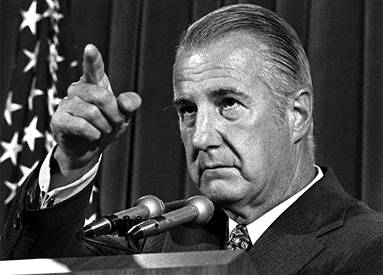
Office of the Governor: Often a stepping-stone to the presidency, though not very likely in 2016 — unless John Kasich surprises (also quite unlikely).
WITH JEB BUSH AND CHRIS CHRISTIE GONE,
JOHN KASICH IS ONLY STATEHOUSE LEADER
STILL RUNNING FOR PRESIDENT THIS YEAR
No longer does being the chief executive of a state
provide easiest, most direct path to the White House
CURRENT AND FORMER GOVERNORS
FINISH AT BOTTOM OF PRESIDENTIAL
CANDIDATES’ HEAP, HAVING LOST
THEIR ONETIME ‘NATIONAL LUSTER’
By David Maril
What happened to the prestige and respect the Office of Governor used to hold when presidential candidates were being selected?
As recently as a year or two ago, political pundits and party insiders were using Barack Obama’s lack of administrative experience as an example of how governors, who have to set budgets and run states, are better prepared to become President.
How many times have we heard the lamenting about all the politicians elected to Congress sitting in their Washington D.C. ivory towers and doing little but raising money for their next election campaign?
We are all too frequently told it is the governors who learn how to govern, making daily decisions that involve budgets, security, infrastructure, while handling emergency situations.
New Jersey Gov. Chris Christie accented the contrast between do-little politicians in Congress and working governors when he cross-examined presidential wannabe Marco Rubio on the debate stage. Rubio was reduced to a dazed state of repeating the same talking points, like a broken record.
The bottom line, however, is that Christie’s stature as sitting Governor in New Jersey did little to save his own campaign. He dropped out of the race a day after a dismal showing in New Hampshire.
The other governors in the GOP presidential race have not done any better.
Former Florida Gov. Jeb Bush, figuring in campaign dollars spent per vote he received, probably ran the most expensive campaign of all time.
Even many Bush Family detractors had to feel sorry for him the pitiful way he fizzled out and absorbed so much abuse from front-runner Donald Trump.
Speaking of refraining from shooting fish in a barrel, the same can be said about former Maryland Gov. Martin O’Malley’s embarrassing pursuit of the Oval Office.
Even some of his severest critics in Maryland had to feel sorry for him stubbornly staying in the race as long as he did. He drew so little attention that he would have been well-advised to wear a sandwich board with his name and a campaign sign on it so people would have known who he was.
However, compared to former Virginia Gov. Jim Gilmore, O’Malley seemed as well-known a celebrity as Broncos’ quarterback Peyton Manning. Gilmore, before dropping out, even had difficulty qualifying for the “kindergarten” second-tier candidate debates.
Even being Governor of a powerful state like New York no longer goes very far.
Former Gov. George Pataki (1995-2006) seemed to drop lower in the polls the more impressive he sounded in the early debates.
John Kasich, the current Ohio Governor, is still hanging in, waiting to see if he can carry his home state two weeks from now and jump-start his campaign. But it seems the last thing Republican voters want is a reasonable, decent person who has a strong record of accomplishment in federal and state government.
One former Governor, 2012 GOP presidential nominee Mitt Romney, made an attempt to return to the limelight on Wednesday.
Romney created a stir by publicly questioning Trump for failing to disclose back income tax returns.
Romney incurred Trump’s wrath by using the billionaire’s own cheap-shot style of questioning whether there is something the candidate is trying to hide.
Ironically, Romney faced the same charge from Democratic leader Harry Reid when he was slow releasing his tax records in 2012.

Mitt Romney, a former governor who failed in his quest to become President, was defeated in 2012. He was sharply critical of 2016 front-runner Trump last week, accusing The Donald of having a “bomb- shell” to hide regarding back income tax returns.
“I think in Donald Trump’s case it is likely to be a bomb- shell,” Romney said on Fox News.
“There are things that could be issues, and when people decide they don’t want to give you their taxes, it’s usually because there’s something they don’t want you to see.”
Trump, of course, did not show the former Governor any respect in his response, calling him one of the dumbest and worst candidates in the history of Republican politics in a Twitter posting.
Make no mistake, however, Republican Party leaders would love to restore the influence of the governor post into their presidential strategy.
You can be sure that there are more than a few GOP insiders who hope if Trump can not be dislodged from the lead in the primaries, he will fall short of the delegate majority needed for the nomination.
If the convention is thereby deadlocked, a compromise candidate like Romney could be called in from the bullpen to unify the party and run.
Maybe today the value of serving as a governor in seeking the presidency has been a bit overrated. Still, there certainly have been a notable few in the modern era, such as Franklin Roosevelt, Jimmy Carter and Ronald Reagan.
But serving as a governor no longer seems to guarantee success on the national front.
Often, governors are quickly forgotten in their own home states.
People in Maryland would certainly recognize O’Malley if they saw him walking down the street. But after serving as Mayor of Baltimore and two terms as Governor, what exactly could he get elected to these days in the state?
It’s rather revealing he never threw his hat in the ring for Barbara Mikulski’s seat when she announced she was not seeking another term in the U.S. Senate.
If someone conducted a poll, asking who, before O’Malley, was Maryland’s last two-term Democratic Governor, few would even remember it was the forgettable Parris Glendening (1995-2003).
More would probably guess it was William Donald Schaefer (1987-95), who seemed larger than life.
Spiro Agnew, who went from being a Republican Governor of Maryland (1967-69) to Richard Nixon’s attack-dog Vice President (1969-73), had so little impact in the 1968 presidential election the ticket did not win his home state the first term.
Agnew, of course, ended up forced out of office for corruption dating back to his Maryland guber- natorial days.

As Governor of Maryland, Spiro Agnew had so little impact on the elec- tion of 1968 that he failed to deliver his own state. However he and Richard Nixon fared better as incumbents in 1972, winning by a land- slide over George McGovern and another Marylander, Sargent Shriver.
Massachusetts had an interesting history of politicians using the job of governor as a stepping stone.
Former Mass. Gov. John A. Volpe (1961– 63 and 1965-69), who had been often mentioned as a possible candidate for Vice President, went on to assume a cabinet post as Secretary of Transporta- tion (1969-73), before becoming U.S. Ambassador to Italy (1973-77).
Michael S. Dukakis, who was Governor from 1975-79 and 1983-91 — riding on a gravy train from bountiful economic times — even gained the Democratic Party’s nomination for President in 1988.
In more recent years, the office of Governor in Massachusetts seemed reduced to a short-term position used for fortifying résumés.
And if you have long-term political aspirations, it can be damaging to your chances if you stay too long as Governor.
Look at the office’s recent history in Massachusetts:
William F. Weld (1991-97) was a popular moderate Republican, who won by a huge margin for a second term but found the job of Governor a cure for insomnia and couldn’t wait to escape from the boredom of a second term.
When he ran for the U.S. Senate in 1996 and lost to John Kerry, he didn’t even bother finishing out his second term as Governor.
The late Paul Cellucci (1997-2001), his successor, fled the country to Canada to take the first U.S. Ambassador’s post available.
Romney did however finish his full term (2003-2007) before running for President.
And, despite continuous rumors that Romney’s successor, Deval Patrick (2007-15), would step down as Governor and receive a cabinet post from Barack Obama, the state’s first black Chief Executive did serve two full terms before retiring.
In his first term, some of Patrick’s supporters were mentioning him as an eventual presidential candidate. But you stopped hearing those rumors the last few years.
Governorships and the presidency seem to have lost their close connection.
It would take a long-shot, like Romney being called into a deadlocked GOP convention and pulling off a victory over the Hillary Clinton/Bernie Sanders survivor, to restore national luster to the job of State Governor.
davidmaril@voiceofbaltimore.org
“Inside Pitch” is a weekly opinion column written for Voice of Baltimore by David Maril.
CHECK OUT LAST WEEK’S “INSIDE PITCH” COLUMN: click here
…and read archived Dave Maril columns by clicking here.







February 28th, 2016 - 10:36 AM
Interesting “Pitch”, is always food for thought. But this week’s fails to account for the fact that going back to Reagan 3 of our last 5 presidents were governors prior to ascending, so where’s the “trend”?
February 28th, 2016 - 5:42 PM
There isnt one, you miscounted. Reagan’s immediate predecesser Jimmie Carter was also a governor, making four of six presidents in forty years who came up as governors. Since 1976 only Obama and papa Bush were not governors.